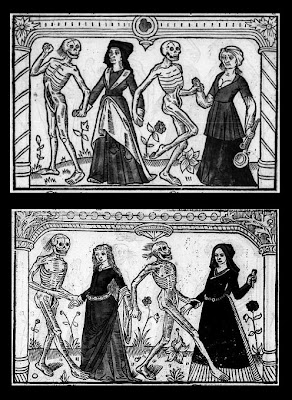
Une chambrière et une entremetteuse
AND Une régente et une femme de chevalier.
AND Une régente et une femme de chevalier.

Une femme d'accueil (ou hotesse) et une nourrice
AND Une femme mariée et une coquette
AND Une femme mariée et une coquette

Une vieille fille et une cordelière
AND Une reine et une duchesse
AND Une reine et une duchesse

Une bergère et une infirme
AND Une sage-femme et une petite fille
AND Une sage-femme et une petite fille

Une bigote et une folle
AND Une revendeuse et une amoureuse
AND Une revendeuse et une amoureuse

La gueule du Leviathan et la mort sur son cheval
AND Les âmes damnés aux Enfers.
AND Les âmes damnés aux Enfers.






In the 'Danse Macabre' genre that derives from the now lost paintings on the walls of the Church of the Holy Innocents in Paris [1424], the famous Parisian printer Guyhot Marchant is said to have preserved the original illustrations in his 1485 publication, 'Danse Macabre'.1
Following from the success of the original work, a second Marchant book was released in 1491: 'Danse Macabre des Femmes' from which the first 6 images above are taken (all 36 woodcuts are available at BNF - scanned from a microfilm of 'Cy est la Danse Macabre des Femmes Toute Hystoriée et Augmentée', 1491 in 2 volumes)
The series follows the traditional pattern of a 2-part didactic poem whereby death calls women from all walks of life to join the inevitable 'Dance of Death', and the women respond. An illuminated manuscript was also made of the series and together they contribute some further understanding about the lives of medieval women - as investigated in the 1994 'The Danse Macabre of Women: Ms. fr. 995 of the Bibliotheque Nationale' Ed. Ann Tukey Harrison, Kent State University Press.
Both the original and female versions of Marchant's 'Danse Macabre' books came to be combined in a single publication and the Médiathèque de l’Agglomération Troyenne have a wonderful web presentation of a late 17th century ammalgamated text (click the image for a flash 'turn the pages' view or click bottom left for a zoomable html version).
The second set of images above come from the Cornell University Rare books Luna Insight browser collection. The only information available states: 'Dis des estats (Les dis des eites) 1513' in the 'Heures a lusaige de Paris' collection. [You can see those words - actually, I think Cornell have transcribed them wrong - in the 3rd last illustration, in red. I read it as something like: 'A talk with the citizens and death's response'.] I feel quite confident they belong to the 'Danse Macabre' genre but alas, I couldn't uncover any further information. (there are no more of these images at Cornell)
- See: 'Guyot Marchant’s Danse Macabre. The Relationship Between Image and Text' by David A. Fein, 2000 [pdf]. {html}
- ' 'Oh Death!': Death, Dying, and the Culture of the Macabre in the Late Middle Ages' Prepared by Emily Rebekah Huber as part of the Camelot Project at the University of Rochester, New York state.
- 1I've now found the earliest book version of the 'Danse Macabre' online, from the 1460s, which I'll post somewhere along the line.
No comments:
Post a Comment